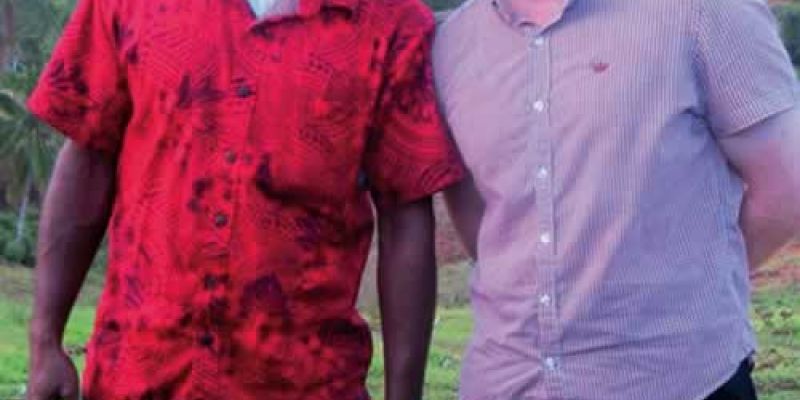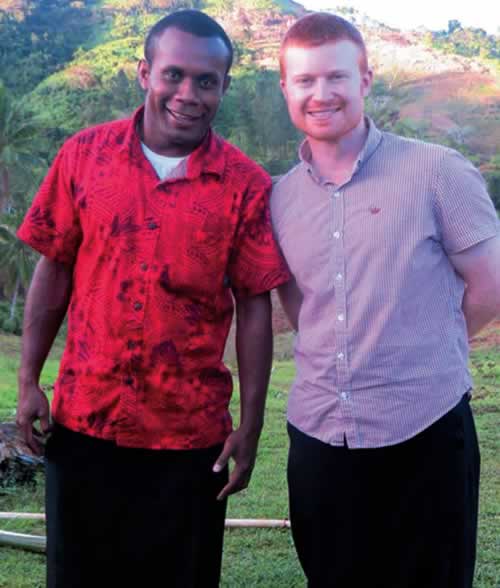
A Learning Experience
Fiji for me will always be one of the most wonderful places in the world. I never expected to end up in Fiji, in the middle of the Pacific Ocean surrounded only by a vast expanse of water. It’s almost impossible to get further away from Ireland, my home country. If I could stick a giant needle through the earth at Ireland and pass it through the center of the earth, it would come out pretty close to Fiji! Yet that is where I found myself, living among the Columban Fathers, a kind and good-humored bunch of priests from Ireland, New Zealand, Peru, and most recently South Korea.

My journey really started during my studies the previous year when I met my momo (uncle in Fijian) Fr. Frank Hoare in Ireland. I told him that I wanted to work in development, perhaps in Africa. He was quick to suggest Fiji, yet at the time I knew nothing about the country other than it was a famous honeymoon destination. I took him up on the idea. The following September 2014, I arrived in Nadi and spent the next four months living in the capital, Suva, occupying the Columban Father’s Bula Suite (the welcome suite in Fijian).
My first four months in Fiji were spent helping out in any way I could and learning as much as I could about the social justice and economic development issues facing Fijian society. My momo (Fr. Frank) told me that the Columbans were interested in developing some type of shorter term lay volunteer model, and he was interested in how things with me would play out. In an effort to help me better understand Fijian customs and traditions I was paired up with a prospective Columban seminarian, Meli Nanuku. We worked together over the next four months, visiting NGOs (non-government organizations), researching their focus and activities and writing a report with the intent to inform the Social Justice and Development Commission of the Archdiocese of Suva about the major issues facing the country. This was an extraordinary learning experience for both of us, as well as the beginning of a fruitful friendship.
Of course I had to do more than this alone to “earn my keep.” My other duties included fetching fresh bread and making sure there was always bread for breakfast. While in Ireland we put the trash bins out only once a week, in Fiji my other duty was to rise early and put the bins out three times per week. I also became the house driver during my four months. I would drive the kitchen staff, Naomi and Sala, home in the evenings, collect the post twice a week, and drive any of the administrative staff on any of their errands. Within days of arriving I felt comfortable there, and by the end of my stay, it felt like family.
One unexpected duty came in the form of a good-humored patient. Roughly half-way through my stay, the director of the region, Columban Fr. Donal McIlraith slipped and split a muscle in his leg. After a rather invasive surgical operation he was left unable to walk and in need of care. I then became a live-in nurse and physiotherapist. As he began to heal and strengthen, he took me on visits to the settlements at the edge of the city. These settlements were the equivalent to slums in other countries, where the urban poor lived. We met the Catholics in the community, discovered which families needed their children baptized and organized their special day at the church. As Fr. Donal became stronger I assisted him on visits to families seeking counseling, visits to families who had just lost a loved one, different churches to say Mass, and brought him to and fro from his scripture lectures. With all of these unique experiences, it felt like I was becoming a missionary priest’s apprentice! It’s fair to say my volunteering experience in Fiji involved me wearing many hats, and assuming many different roles while coming to a deep and profound understanding of a culture completely different from my own.
After staying almost four months, I departed for the Philippines to continue volunteering. Coincidentally I spent the next four months volunteering with an NGO called PREDA which is run by Columban Fr. Shay Cullen. This was also an incredible experience, where I worked alongside some of the most inspirational people I have ever met. I worked with youths in conflict with the law, and I was involved in jail visits aiming to find youths as young as eleven or twelve years old behind bars. PREDA, among other activities, rescues youths from prison cells which at times could hold up to twenty teenagers in one large room, then it offers a diversion program where they can continue their education, practice sports and have their legal cases supported. Following my time at PREDA, I volunteered as a laborer with an NGO called All Hands Volunteers building houses in Tacloban, a city devastated by two consecutive hurricanes. I volunteered there for two months. Luckily I was given a free volunteer visa, as well as free food and accommodation by the NGO in exchange for a six day work week. Heavy duty laboring was tough work but allowed me to lose some pounds I had put on in Fiji!
After seven months in the Philippines I returned to Fiji to begin a little project Columban seminarian Meli and I had been planning. During our time researching NGOs, we had learned some very interesting things in the area of income generation. Honey demand in Fiji is high, yet production is low, so Fiji needs to import much of its honey. This is needless given Fiji’s climate and capacity to produce honey. From an NGO called FRIEND we learned that an investment of 3,000 Fiji dollars ($1,388.00 U.S.) could give an annual return of 5,000- 6,000 Fiji dollars ($2,314-$2,777.00 U.S.) annually. This is substantial given that minimum wage is roughly 80 Fiji dollars ($37.00 U.S.) per week. We also learned from Conservation International that Fiji needed to plant trees to prevent flooding and the death of its coral reefs from mud flows. One of the trees they encouraged people to plant was called sandalwood or in Fijian, yasi. We discovered that a twenty-year-old tree could be sold for anything between 5,000 Fiji dollars ($2,314.00 U.S.) and 15,000 Fiji dollars ($6,943.00 U.S.).
We planned to create a type of Ireland-Fiji partnership where some capital from Ireland (my family and friends) could initiate some income generation that could bring a return. This plan brought me back to Fiji and up to Namataveikai, a beautiful village in the province of Ra. Here I was given a taste of the reality of village life. I stayed in the village for two weeks and bought four doubleset bee boxes, with bees included, along with some training from a local company called McKenzie Beeline. This company also offered to buy our honey which brought our business model to completion.
While we were there, we talked a lot about sandalwood, how it’s grown and its income potential. Meli’s family constructed a nursery made solely from bamboo and coconut leaves. Now, once we start to see profits from the beehives, they plan to buy seeds for the sandalwood nursery. We divide the beehive profits 50-50, and I hope to save my share to buy a honey extractor, which will double the value of the honey we produce. Meli plans to put his 50% share into a fund to build a Catholic church for his village. Jokingly he told me he’ll name it St. Patrick’s.
The last part of my return visit to Fiji included a week-long visit to the Tutu Rural Training Center, run by the Marists Fathers, in the island of Taveuni. This visit has to be one of my favorite experiences during my time in Fiji. At Tutu I witnessed how the strong bonds and relationships between the people are the cornerstones of their culture. I began to understand that while we in the west emphasize the need to accumulate wealth and expertise in order to be viewed as successful and thus respected, Fijians generally don’t have the same drives because they receive respect and esteem by simply being and becoming older. As a hierarchical society, men become respected, influential elders not by virtue of the wealth they have accumulated but by simply being an elder and a decision-maker in their family. I believe this to be one of the reasons a capitalist mindset has found it so difficult to take hold of the indigenous Fijian’s mindset. However in Tutu, farmers are encouraged to become responsible members of greater Fijian society and not only responsible for their immediate family and village. Being responsible for greater Fiji encourages these young farmers to reach their potential and make their farms productive enterprises. Farmers learn to manage their time, treat their farms like a business and have goals such as a five year plan. When they do this they can do very well and produce the food to feed a nation.
At Tutu young farmers must plant a set number of yangona plants (which is much in demand as a non-alcoholic social drink) each year in order to be enrolled. At the end of their three-year course they can harvest their plants and sell them from anything between 20,000 Fiji dollars ($9,257.00 U.S) to 40,000+ Fiji dollars ($18,514.00 U.S.). This capital gives them the start they need to build a house, buy machinery and attract a wife.
At present I’m living in rural Guatemala, volunteering with an educational organization. It’s a different culture, different language and a different feeling, but like my other homes, the mosquitoes are as annoying as ever.
Patrick O’Dwyer is the nephew of Columban Fr. Frank Hoare.


 The Columbans are a society of missionaries, including priests and lay people, who minister to people of various cultures as a way of witnessing to the universal love of God.
The Columbans are a society of missionaries, including priests and lay people, who minister to people of various cultures as a way of witnessing to the universal love of God.